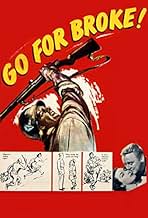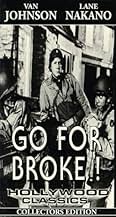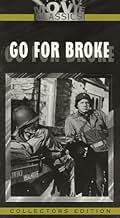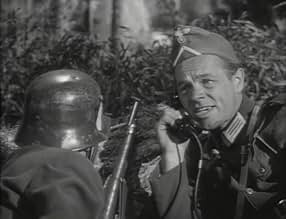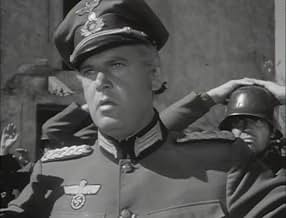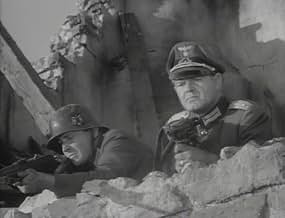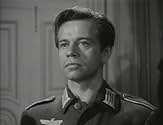NOTE IMDb
6,6/10
1,9 k
MA NOTE
Ajouter une intrigue dans votre langueThe story of Japanese-American soldiers who fought in Europe during World War II.The story of Japanese-American soldiers who fought in Europe during World War II.The story of Japanese-American soldiers who fought in Europe during World War II.
- Réalisation
- Scénario
- Casting principal
- Nommé pour 1 Oscar
- 1 victoire et 1 nomination au total
Gianna Maria Canale
- Rosina
- (as Gianna Canale)
Luis Aihara
- Soldier
- (non crédité)
Richard Anderson
- Lieutenant
- (non crédité)
Danny Aredas
- Masami's Buddy
- (non crédité)
Paul Bannai
- Mail Clerk
- (non crédité)
John Banner
- German Officer
- (non crédité)
Hugh Beaumont
- Chaplain
- (non crédité)
Commentaire à la une
Being a third generation Japanese-American (Sansei), and having my parents interned in the camps, this movie has a special place in my heart. Robert Pirosh did an incredible job in getting so much information about the Japanese- American situation: the camps, the differences between the Hawaiian and State- side Japanese (Kotonks and Kanakas), the different views of the war and even using a Japanese curse word as a password! I was so impressed and pleased with the results.
The movie follows the exploits of the 442, the first all-Nisei (Japanese- American) Regimental combat team in WWII. In early 1942, all the Japanese- Americans in California, Seattle, Oregon and Hawaii were uprooted from their homes and put into camps. All the volunteers were from the 10 internment camps throughout the western states. They felt that this was the only way to prove to the U. S. that they were as patriotic as anybody else, in fact most of them were American Citizens! Since they had nothing to lose, but their lives, their motto was "GO FOR BROKE!" and that's what they did. They are today the most decorated battalion in the history of the U.S. military and proved something that they shouldn't have to be proved, that they were Americans!
Van Johnson is used as the "white man" foil, to show how the rest of the country looked at the Japanese-American, and he does a great job. He starts off as a bigot, but as he begins to understand and respect his troops, he becomes one of them. There's a funny scene where one of his men call him "BAKATARE",
which is a curse word close to "Damn, stupid...." and tells him that the soldier is being very polite, he's bowing as he says this. This film has everything: humor, action, great characters and... truth!
The movie follows the exploits of the 442, the first all-Nisei (Japanese- American) Regimental combat team in WWII. In early 1942, all the Japanese- Americans in California, Seattle, Oregon and Hawaii were uprooted from their homes and put into camps. All the volunteers were from the 10 internment camps throughout the western states. They felt that this was the only way to prove to the U. S. that they were as patriotic as anybody else, in fact most of them were American Citizens! Since they had nothing to lose, but their lives, their motto was "GO FOR BROKE!" and that's what they did. They are today the most decorated battalion in the history of the U.S. military and proved something that they shouldn't have to be proved, that they were Americans!
Van Johnson is used as the "white man" foil, to show how the rest of the country looked at the Japanese-American, and he does a great job. He starts off as a bigot, but as he begins to understand and respect his troops, he becomes one of them. There's a funny scene where one of his men call him "BAKATARE",
which is a curse word close to "Damn, stupid...." and tells him that the soldier is being very polite, he's bowing as he says this. This film has everything: humor, action, great characters and... truth!
Histoire
Le saviez-vous
- AnecdotesSeveral of the main characters were played by actual members of the 442nd Regimental Combat Team depicted in the film. The men saw action with the outfit in Italy and France.
- GaffesDuring the battle in the ruins, the GI holds the mortar tube with his bare hands and fire around ten shells. At that time the tube would have been too hot to handle it bare handed.
- Citations
[last lines]
Narrator: [voiceover] Battle honors. By order of the Secretary of War, in the name of the President of the United States, as public evidence of deserved honor and distinction, the 442nd Regimental Combat Team is cited for outstanding accomplishment in combat. The gallantry and espirit de corps displayed by their officers and men in bitter action against a formidable enemy exemplify the finest traditions of the armed forces of the United States.
- ConnexionsEdited into WW II Theater: Go For Broke (2022)
- Bandes originalesThe Meaning of Love
Written by Robert Pirosh, Alberto Colombo and Ken K. Okamoto
Meilleurs choix
Connectez-vous pour évaluer et suivre la liste de favoris afin de recevoir des recommandations personnalisées
Détails
Box-office
- Budget
- 1 337 000 $US (estimé)
- Durée1 heure 32 minutes
- Couleur
- Rapport de forme
- 1.37 : 1
Contribuer à cette page
Suggérer une modification ou ajouter du contenu manquant

Lacune principale
By what name was Tout ou rien (1951) officially released in India in English?
Répondre










